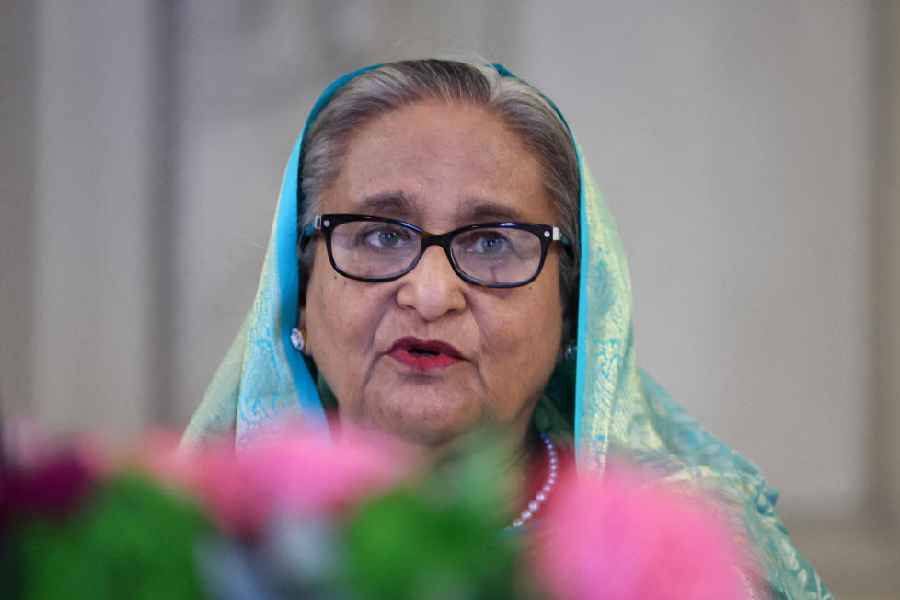The trial process leading to the death sentence to Bangladesh's ousted prime minister Sheikh Hasina by a special tribunal suffered from several lapses including "unconstitutional" appointment of judges that raised questions over its fairness, people familiar with the matter said on Tuesday.
The three judges in the country's International Crimes Tribunal (ICT) were appointed in violation of the Constitution and the verdict appeared to be "predetermined", they said.
Hasina, 78, was on Monday sentenced to death in absentia by the ICT for "crimes against humanity" over her government's brutal crackdown on student-led protests last year.
The Awami League leader has been living in India since she fled Bangladesh on August 5 last year in the face of the massive protests.
The people cited above also questioned the authority of the ICT to carry out the trial against Hasina saying it was instituted based on the International Crimes (Tribunals) Act of 1973. The amendments to this act were incorporated in 2008 to address crimes of genocide committed during the Bangladesh Liberation War of 1971.
Amendments to the scope of the ICT Act 1973 were made after Aug 5, 2024 through an ordinance.
This, the people said, is invalid as the Parliament has not approved it.
The Bangladesh president is not empowered to issue the ordinance (Art 93) as the dissolution of the Parliament was not as per procedure, they added.
The people said the present three judges in the ICT were appointed in violation of the Constitution.
The Chairman of ICT, Golam Mortuza Majumder, a retired district court judge, was appointed as a high court judge only six days before announcement that the ICT will examine the cases, they said.
The second appointee Mohitul Haque Mohammad Enam Chowdhury is a retired district and sessions judge and the third one is a lawyer Shafiul Alam Mahmud, who like Majumdar, was appointed a few days ago as a high court judge, they said.
They were made permanent judges in violation of Article 98 of Bangladesh constitution, the people said.
None of the designated judges have prior experience in applying international legal principles, a gap that is significant in trials involving crimes against humanity, they said.
The people said the prosecution and defence advocates "gamed" the trial process and the outcome was "predetermined" The appointment of Mohammad Tajul Islam as the Chief Prosecutor of the ICT raises serious questions of prosecutorial neutrality, they said, adding the appointment of Toby Cadman as Special Adviser to the Chief Prosecutor of the Bangladesh International Crimes Tribunal is similarly flawed.
He was the lawyer for Jamaat in the trials conducted against them by the Awami League government, the people said adding this "smacks" of a "vindictive mindset" and a conflict of interest at the outset.
Hasina has maintained that she was denied the opportunity to have lawyers of her choice to defend her in the case.
The State appointed defence lawyer Mohammad Amir Hossain to represent Hasina has no prior experience with International Criminal Law, the people cited above said.
Hossain has been quoted as saying that he didn't attempt to communicate with Hasina as there was no provision allowing for such contacts.
Hossain received all the evidence relied on by the prosecution on June 25, about five weeks before the first day of the trial.
Considering the volume of evidence, the people expressed surprise that he didn't seek additional time to prepare for the trial that began on August 3. This has led legal analysts to question the seriousness of defence attorneys "There are broader questions about the fairness of the trial in the absence of the accused, especially when capital punishment was awarded. Trials involving volumes of evidence and multiple witnesses usually take many months," one of the people said.
"However, proceedings in Hasina's trial began on August 3 and were concluded by October 23, raising questions about procedural fairness and whether the outcome was predetermined," the person said.
Following the ICT's death sentence to her, Hasina said the verdict was given by a "rigged tribunal established and presided over by an unelected government" and was aimed at nullifying the Awami League as a political force.
Except for the headline, this story has not been edited by The Telegraph Online staff and has been published from a syndicated feed.










